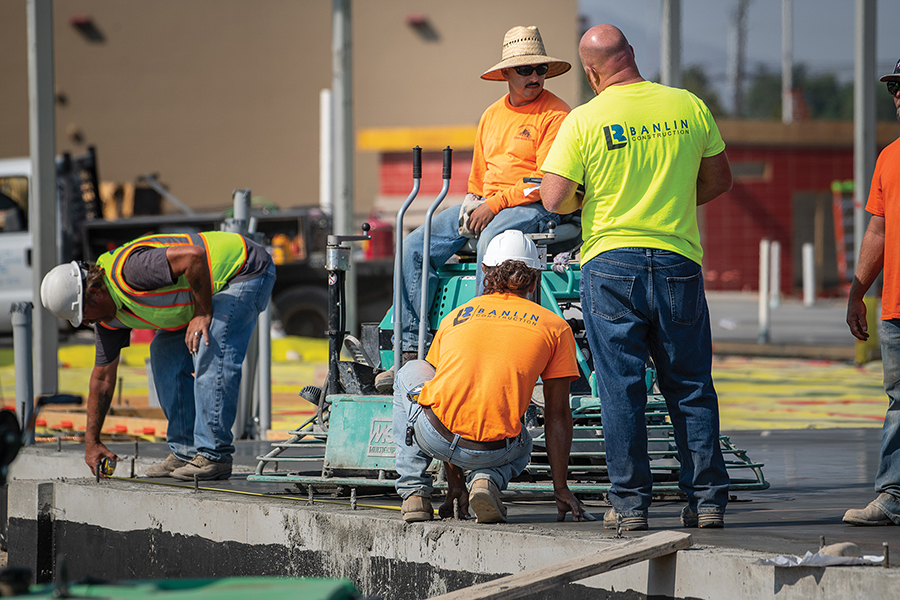
Home » Commercial Real Estate: Construction industry watching to see how Covid-19 rewrites Tri-Cities’ big plans
Commercial Real Estate: Construction industry watching to see how Covid-19 rewrites Tri-Cities’ big plans

October 15, 2020
The Tri-Cities is coming off a banner year for commercial construction. New schools dot the region. A new cold storage warehouse is taking shape in north Pasco.
Kennewick’s Vista Field is stocked with utility lines, paved streets, lamps and a water feature, waiting for private developers to build an urban village in the heart of the Tri-Cities.
A Richland grain company is dramatically upgrading its rail-side facility, and Park Place at the city’s gateway is ready to welcome tenants to its retail spaces and 100-plus apartment units.
Through August, Benton and Franklin counties and the cities of Kennewick, Pasco, Richland, West Richland, Prosser and Benton City issued non-residential building permits worth $420 million. That’s down from the $590 million permitted during the same period in 2019, which saw a boom in school construction and other projects, such as Vista Filed.
Commercial construction totaled less than $300 million in both 2017 and 2018, making 2020 a relatively solid year for commercial starts.
The future, however, is about as clear as the smoke that obliterated Tri-City skies in mid-September. The Covid-19 pandemic is rewriting how people and businesses use real estate.
The pandemic is creating winners and losers, much the way it helped Washington asparagus growers in the spring while hurting potato growers.
A new normal
Agriculture and related manufacturing continue to invest in new facilities, said Joel Bouchey, regional coordinator for the Inland Northwest chapter of Associated General Contractors.
Office and retail could be a challenge.
Brick-and-mortar retailers, already reeling from online competition, are hard hit by the pandemic.
“Restaurants and small shops that shuttered for Covid aren’t reopening. We are concerned there will be a long-term glut of available space in those sectors. Recovery could take some time,” Bouchey said.
Office space is another unknown.
Gov. Jay Inslee’s March Stay Home, Stay Healthy order made working from home the new normal for many. For some, it could be a permanent move, putting the future of the one-person, one-desk model in question.
Locally, AGC speculates the new social distancing rules could trigger a surge in renovations.
But what does that really look like in the long term?
CBRE, a global real estate firm, said U.S. employers vacated 50 million square feet more space than they leased in the first half of 2020 in its midyear office outlook. It was the first decline in annual leasing since 2009.
While the rise in vacancy is prompting developers to shelve or reduce development plans, CBRE also notes that social distancing measures require more space between workers, mitigating the downsizing trend.
“The work-from-home experiment has proven technically possible, but at what cost to corporate culture, collaboration and innovation? Any increase in remote-working represents a headwind to office demand, with wider ramifications in terms of location priorities for investors and occupiers,” CBRE wrote in its August review.
AGC, Bouchey said, is watching the long-term effects and intends to lobby the 2021 Washington Legislature to consider an infrastructure package to boost local and state construction spending.
“We’d love some federal funding for that type of stuff,” he added, citing the 2009 American Recovery and Reinvestment Act, aka the stimulus package, as a model for keeping the construction industry going during an economic downturn.
That said, he notes that the Tri-City economy tends to avoid the worst swings, thanks to the stabilizing effects of federal spending at Hanford and Pacific Northwest National Laboratory, and local agricultural production and processing.
“The Tri-Cities tends to ride things out better than others,” he said.
Infrastructure projects
Bouchey said he’s paying close attention to infrastructure projects such as Pasco’s Lewis Street overpass, Kennewick’s Ridgeline Drive underpass at Highway 395 and Richland’s Duportail Bridge, which is now wrapping up.
Pasco planned to begin work on its long-planned Lewis Street overpass in 2020, but the state-funded project was paused after voters approved I-976, rolling back car tabs and other fees.
The city has not yet solicited bids from contractors for what promises to be a complicated undertaking. The project includes building a bridge over a busy rail corridor and backfilling the 1930s era tunnel that carries Lewis Street beneath the tracks.
The city approved a $1.2 million agreement with BNSF Railway in August to facilitate the project.
Elsewhere, contractors are busy building fire stations across the region, including multiple stations in Kennewick, Pasco, Richland and West Richland.

West Richland is preparing to begin work on its new police station at the Tri-City Raceway, a project that will include a small dog pound to hold dogs before they’re transferred to animal control.
Total Site Services Inc., a woman-owned Richland general and civil construction firm, is building fire stations for Kennewick and Naches. Its current roster includes micro homes for the Kennewick Housing Authority and a brewery at Horn Rapids, said Shannon Toranzo, general manager.
Owner Lisa Chapman-Rosa said the company is keeping a solid outlook as it wraps up one high profile project, a $4.9 million project to install roads, utilities and other infrastructure at Vista Field for the Port of Kennewick.
Work was slowed as the pandemic and governor’s shutdown order took hold in March that temporarily included construction. The slowdown interrupted labor availability and made it difficult to source key electronics for the project.
The project was substantially complete by late September.
Chapman-Rosa praised the port for its patience with delays. Everyone was in similar straits when the pandemic upended expectations for the year, she said.
The pandemic isn’t done with construction. Labor is hard to come by, she said.
Mandatory quarantining for workers exposed to coronavirus can still upset construction schedules. In mid-September, a subcontractor scheduled to finish paving a road in Prosser had to reschedule its work when it lost a crew because of a Covid exposure.
That happened the same week that smoke blanketed the Mid-Columbia, forcing Total Site Services to shut down work sites to avoid exposing workers to hazardous air.
“The Covid is still affecting the job,” Chapman-Rosa said.
Chapman-Rosa and Toranzo said communicating with clients is the key to avoiding conflict when plans get derailed.
Both say they’re grateful for the hard work the industry and its advocates are putting into complying with the new safety requirements for construction.
“We’re all in this together. We’re not doing anything anyone else isn’t having to do,” Chapman-Rosa said.
Construction + Real Estate
KEYWORDS october 2020





